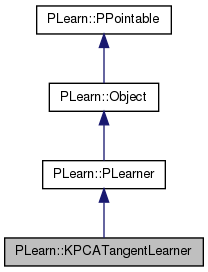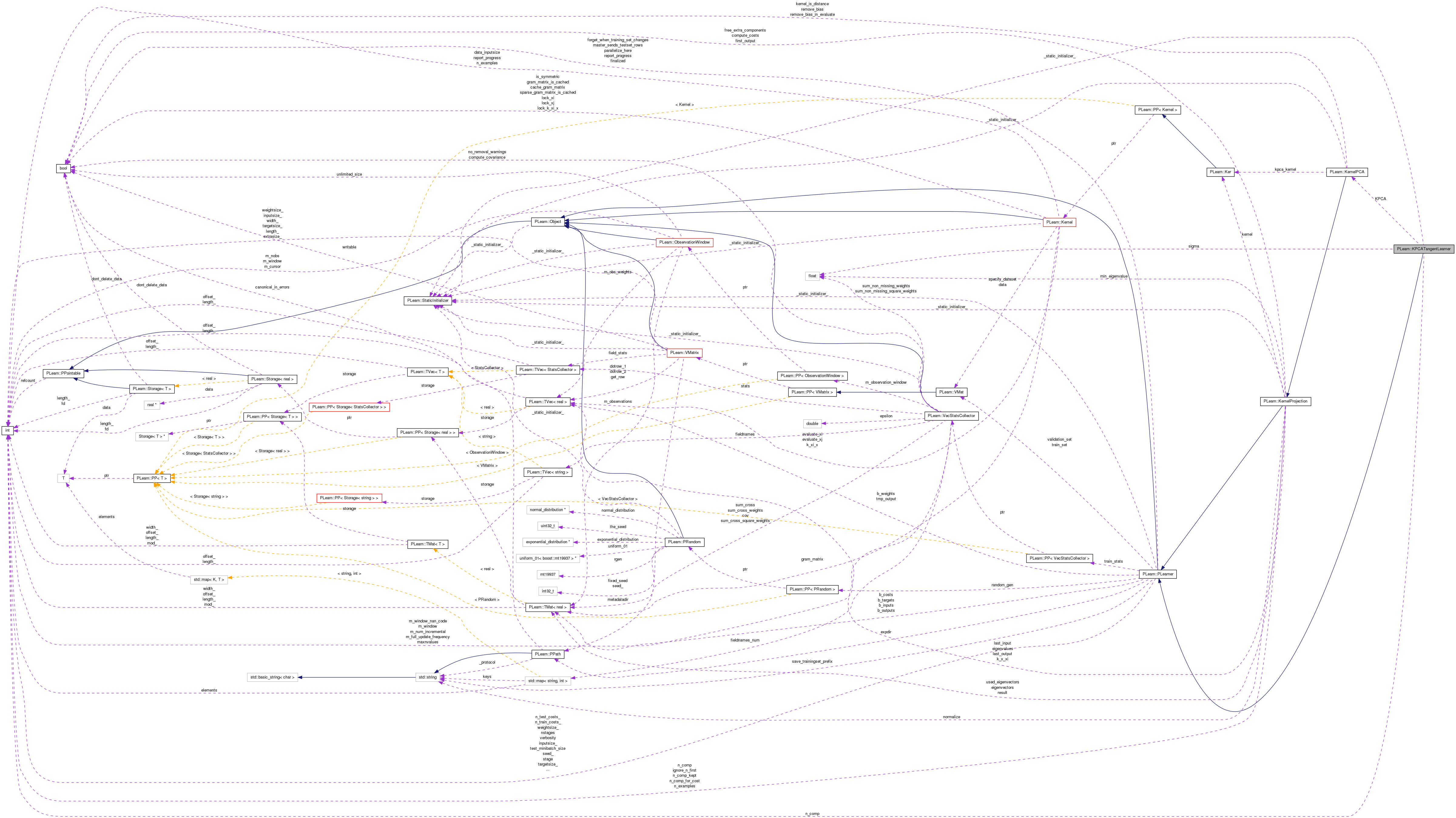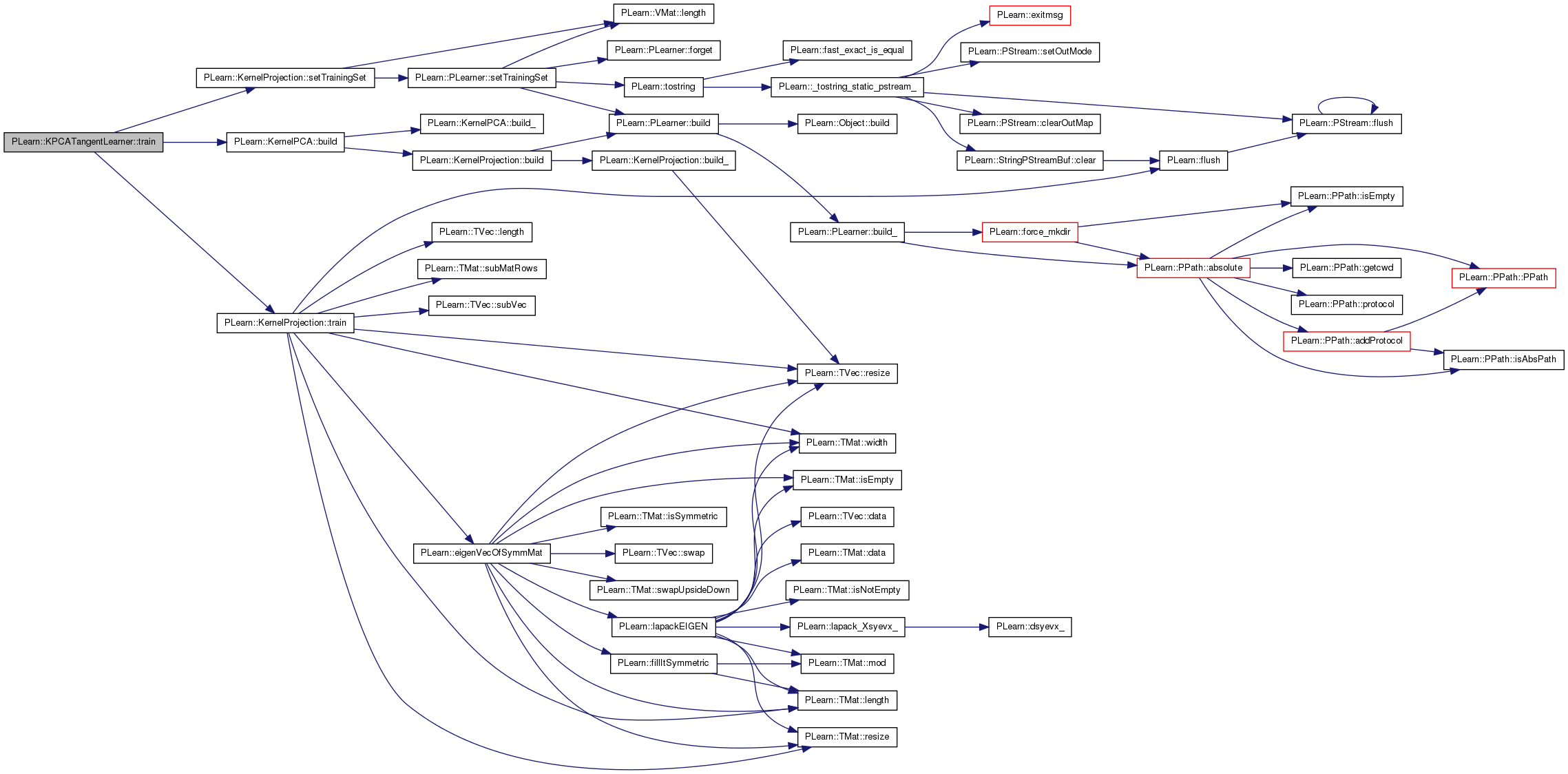|
PLearn 0.1
|
|
PLearn 0.1
|
#include <KPCATangentLearner.h>


Public Member Functions | |
| KPCATangentLearner () | |
| Default constructor. | |
| virtual void | build () |
| Simply calls inherited::build() then build_(). | |
| virtual void | makeDeepCopyFromShallowCopy (CopiesMap &copies) |
| Transforms a shallow copy into a deep copy. | |
| virtual string | classname () const |
| virtual OptionList & | getOptionList () const |
| virtual OptionMap & | getOptionMap () const |
| virtual RemoteMethodMap & | getRemoteMethodMap () const |
| virtual KPCATangentLearner * | deepCopy (CopiesMap &copies) const |
| virtual int | outputsize () const |
| Returns the size of this learner's output, (which typically may depend on its inputsize(), targetsize() and set options). | |
| virtual void | forget () |
| (Re-)initializes the PLearner in its fresh state (that state may depend on the 'seed' option) And sets 'stage' back to 0 (this is the stage of a fresh learner!). | |
| virtual void | train () |
| The role of the train method is to bring the learner up to stage==nstages, updating the train_stats collector with training costs measured on-line in the process. | |
| virtual void | computeOutput (const Vec &input, Vec &output) const |
| Computes the output from the input. | |
| virtual void | computeCostsFromOutputs (const Vec &input, const Vec &output, const Vec &target, Vec &costs) const |
| Computes the costs from already computed output. | |
| virtual TVec< string > | getTestCostNames () const |
| Returns the names of the costs computed by computeCostsFromOutpus (and thus the test method). | |
| virtual TVec< string > | getTrainCostNames () const |
| Returns the names of the objective costs that the train method computes and for which it updates the VecStatsCollector train_stats. | |
Static Public Member Functions | |
| static string | _classname_ () |
| static OptionList & | _getOptionList_ () |
| static RemoteMethodMap & | _getRemoteMethodMap_ () |
| static Object * | _new_instance_for_typemap_ () |
| static bool | _isa_ (const Object *o) |
| static void | _static_initialize_ () |
| static const PPath & | declaringFile () |
Public Attributes | |
| int | n_comp |
| real | sigma |
Static Public Attributes | |
| static StaticInitializer | _static_initializer_ |
Static Protected Member Functions | |
| static void | declareOptions (OptionList &ol) |
| Declares this class' options. | |
Protected Attributes | |
| KernelPCA | KPCA |
Private Types | |
| typedef PLearner | inherited |
Private Member Functions | |
| void | build_ () |
| This does the actual building. | |
Definition at line 53 of file KPCATangentLearner.h.
typedef PLearner PLearn::KPCATangentLearner::inherited [private] |
Reimplemented from PLearn::PLearner.
Definition at line 58 of file KPCATangentLearner.h.
| PLearn::KPCATangentLearner::KPCATangentLearner | ( | ) |
Default constructor.
Definition at line 54 of file KPCATangentLearner.cc.
| string PLearn::KPCATangentLearner::_classname_ | ( | ) | [static] |
Reimplemented from PLearn::PLearner.
Definition at line 63 of file KPCATangentLearner.cc.
| OptionList & PLearn::KPCATangentLearner::_getOptionList_ | ( | ) | [static] |
Reimplemented from PLearn::PLearner.
Definition at line 63 of file KPCATangentLearner.cc.
| RemoteMethodMap & PLearn::KPCATangentLearner::_getRemoteMethodMap_ | ( | ) | [static] |
Reimplemented from PLearn::PLearner.
Definition at line 63 of file KPCATangentLearner.cc.
Reimplemented from PLearn::PLearner.
Definition at line 63 of file KPCATangentLearner.cc.
| Object * PLearn::KPCATangentLearner::_new_instance_for_typemap_ | ( | ) | [static] |
Reimplemented from PLearn::Object.
Definition at line 63 of file KPCATangentLearner.cc.
| StaticInitializer KPCATangentLearner::_static_initializer_ & PLearn::KPCATangentLearner::_static_initialize_ | ( | ) | [static] |
Reimplemented from PLearn::PLearner.
Definition at line 63 of file KPCATangentLearner.cc.
| void PLearn::KPCATangentLearner::build | ( | ) | [virtual] |
Simply calls inherited::build() then build_().
Reimplemented from PLearn::PLearner.
Definition at line 97 of file KPCATangentLearner.cc.
References PLearn::PLearner::build(), and build_().
{
inherited::build();
build_();
}

| void PLearn::KPCATangentLearner::build_ | ( | ) | [private] |
This does the actual building.
Reimplemented from PLearn::PLearner.
Definition at line 85 of file KPCATangentLearner.cc.
Referenced by build().
{
// ### This method should do the real building of the object,
// ### according to set 'options', in *any* situation.
// ### Typical situations include:
// ### - Initial building of an object from a few user-specified options
// ### - Building of a "reloaded" object: i.e. from the complete set of all serialised options.
// ### - Updating or "re-building" of an object after a few "tuning" options have been modified.
// ### You should assume that the parent class' build_() has already been called.
}

| string PLearn::KPCATangentLearner::classname | ( | ) | const [virtual] |
Reimplemented from PLearn::Object.
Definition at line 63 of file KPCATangentLearner.cc.
| void PLearn::KPCATangentLearner::computeCostsFromOutputs | ( | const Vec & | input, |
| const Vec & | output, | ||
| const Vec & | target, | ||
| Vec & | costs | ||
| ) | const [virtual] |
Computes the costs from already computed output.
Implements PLearn::PLearner.
Definition at line 212 of file KPCATangentLearner.cc.
{
// Compute the costs from *already* computed output.
// ...
}
Computes the output from the input.
Reimplemented from PLearn::PLearner.
Definition at line 151 of file KPCATangentLearner.cc.
References PLearn::KernelProjection::eigenvectors, i, PLearn::PLearner::inputsize(), j, PLearn::KernelProjection::kernel, KPCA, PLearn::VMat::length(), n_comp, PLearn::PLearner::n_examples, sigma, PLearn::sum(), and PLearn::TMat< T >::toVec().
{
PP<AdditiveNormalizationKernel> ank = dynamic_cast<AdditiveNormalizationKernel*>((Kernel*)KPCA.kernel);
PP<GaussianKernel> gk = dynamic_cast<GaussianKernel*>((Kernel*)ank->source_kernel);
VMat trainset = ank->specify_dataset;
int n_examples = trainset->length();
Mat result(n_comp,inputsize());
Vec dkdx(inputsize()); //dk/dx
Vec temp(inputsize());
Vec term2(inputsize());
Vec sum(inputsize());
Mat diK_dx(n_examples,inputsize());
int i,j,nc;
sum<<0;
for(j=0;j<n_examples;++j) {
trainset->getRow(j,temp);
//real nt = norm(input-temp);
// le noyau me renvoie ce que je veux mais les valeurs sont toutes petites: pb de sigma
//cout<<gk->evaluate(temp,input)<<" "<<exp(-(nt*nt)/(sigma*sigma))<<endl;
sum += gk->evaluate(temp,input)*(input-temp)/(sigma*sigma);
}
for(i=0;i<n_examples;++i) {
trainset->getRow(i,temp);
term2 << gk->evaluate(temp,input)*(input-temp)/(sigma*sigma);
//cout<<term2<<endl;
//cout<<sum;
diK_dx(i) << (term2 - sum/n_examples); // on a le moins qui vient du moins de la dérivation de de exp(-)
//diK_dx(i) << (sum/n_examples - term2); // exactement la formule de NIPS
//cout<<diK_dx(i);
}
for(nc=0;nc<n_comp;++nc)
{
// compute the corresponding vector with the Nystrom formula
// d ek / dx = 1/n sum_i dK/dX
// initialisation
temp<<(0);
for(i=0;i<n_examples;++i)
{
temp += (KPCA.eigenvectors(nc,i) * diK_dx(i));
}
// on ne normalise pas car c'est la direction vecteur qui nous interesse et pas sa norme
// en plus on normalise tout a 1 dans matlab pour eviter les erreurs numériques.
// result(nc)<<(temp/iso_learner.eigenvalues[nc]);
result(nc)<<(temp);
}
//cout<<result;
// toVec: a mettre dans l'aide
output << result.toVec();
}

| void PLearn::KPCATangentLearner::declareOptions | ( | OptionList & | ol | ) | [static, protected] |
Declares this class' options.
Reimplemented from PLearn::PLearner.
Definition at line 65 of file KPCATangentLearner.cc.
References PLearn::OptionBase::buildoption, PLearn::declareOption(), PLearn::PLearner::declareOptions(), KPCA, PLearn::OptionBase::learntoption, n_comp, and sigma.
{
// ### Declare all of this object's options here
// ### For the "flags" of each option, you should typically specify
// ### one of OptionBase::buildoption, OptionBase::learntoption or
// ### OptionBase::tuningoption. Another possible flag to be combined with
// ### is OptionBase::nosave
declareOption(ol, "sigma", &KPCATangentLearner::sigma, OptionBase::buildoption,
"Sigma");
declareOption(ol, "n_comp", &KPCATangentLearner::n_comp, OptionBase::buildoption,
"Number of Components");
declareOption(ol, "KPCA", &KPCATangentLearner::KPCA, OptionBase::learntoption,
"");
// Now call the parent class' declareOptions
inherited::declareOptions(ol);
}

| static const PPath& PLearn::KPCATangentLearner::declaringFile | ( | ) | [inline, static] |
Reimplemented from PLearn::PLearner.
Definition at line 122 of file KPCATangentLearner.h.
| KPCATangentLearner * PLearn::KPCATangentLearner::deepCopy | ( | CopiesMap & | copies | ) | const [virtual] |
Reimplemented from PLearn::PLearner.
Definition at line 63 of file KPCATangentLearner.cc.
| void PLearn::KPCATangentLearner::forget | ( | ) | [virtual] |
(Re-)initializes the PLearner in its fresh state (that state may depend on the 'seed' option) And sets 'stage' back to 0 (this is the stage of a fresh learner!).
(Re-)initialize the PLearner in its fresh state (that state may depend on the 'seed' option) And sets 'stage' back to 0 (this is the stage of a fresh learner!)
A typical forget() method should do the following:
Reimplemented from PLearn::PLearner.
Definition at line 126 of file KPCATangentLearner.cc.
{
}
| OptionList & PLearn::KPCATangentLearner::getOptionList | ( | ) | const [virtual] |
Reimplemented from PLearn::Object.
Definition at line 63 of file KPCATangentLearner.cc.
| OptionMap & PLearn::KPCATangentLearner::getOptionMap | ( | ) | const [virtual] |
Reimplemented from PLearn::Object.
Definition at line 63 of file KPCATangentLearner.cc.
| RemoteMethodMap & PLearn::KPCATangentLearner::getRemoteMethodMap | ( | ) | const [virtual] |
Reimplemented from PLearn::Object.
Definition at line 63 of file KPCATangentLearner.cc.
| TVec< string > PLearn::KPCATangentLearner::getTestCostNames | ( | ) | const [virtual] |
Returns the names of the costs computed by computeCostsFromOutpus (and thus the test method).
Implements PLearn::PLearner.
Definition at line 219 of file KPCATangentLearner.cc.
{
// Return the names of the costs computed by computeCostsFromOutpus
// (these may or may not be exactly the same as what's returned by getTrainCostNames).
// ...
return TVec<string>();
}
| TVec< string > PLearn::KPCATangentLearner::getTrainCostNames | ( | ) | const [virtual] |
Returns the names of the objective costs that the train method computes and for which it updates the VecStatsCollector train_stats.
Implements PLearn::PLearner.
Definition at line 227 of file KPCATangentLearner.cc.
{
// Return the names of the objective costs that the train method computes and
// for which it updates the VecStatsCollector train_stats
// (these may or may not be exactly the same as what's returned by getTestCostNames).
// ...
return TVec<string>();
}
| void PLearn::KPCATangentLearner::makeDeepCopyFromShallowCopy | ( | CopiesMap & | copies | ) | [virtual] |
Transforms a shallow copy into a deep copy.
Reimplemented from PLearn::PLearner.
Definition at line 104 of file KPCATangentLearner.cc.
References PLearn::PLearner::makeDeepCopyFromShallowCopy(), and PLERROR.
{
inherited::makeDeepCopyFromShallowCopy(copies);
// ### Call deepCopyField on all "pointer-like" fields
// ### that you wish to be deepCopied rather than
// ### shallow-copied.
// ### ex:
// deepCopyField(trainvec, copies);
// ### Remove this line when you have fully implemented this method.
PLERROR("KPCATangentLearner::makeDeepCopyFromShallowCopy not fully (correctly) implemented yet!");
}

| int PLearn::KPCATangentLearner::outputsize | ( | ) | const [virtual] |
Returns the size of this learner's output, (which typically may depend on its inputsize(), targetsize() and set options).
Implements PLearn::PLearner.
Definition at line 119 of file KPCATangentLearner.cc.
References PLearn::PLearner::inputsize(), and n_comp.
{
// Compute and return the size of this learner's output (which typically
// may depend on its inputsize(), targetsize() and set options).
return inputsize()*n_comp;
}

| void PLearn::KPCATangentLearner::train | ( | ) | [virtual] |
The role of the train method is to bring the learner up to stage==nstages, updating the train_stats collector with training costs measured on-line in the process.
Implements PLearn::PLearner.
Definition at line 138 of file KPCATangentLearner.cc.
References PLearn::KernelPCA::build(), KPCA, PLearn::KernelPCA::kpca_kernel, n_comp, PLearn::KernelProjection::n_comp, PLearn::KernelProjection::setTrainingSet(), sigma, PLearn::KernelProjection::train(), and PLearn::PLearner::train_set.
{
// The role of the train method is to bring the learner up to stage==nstages,
// updating train_stats with training costs measured on-line in the process.
KPCA.n_comp = n_comp;
KPCA.kpca_kernel = new GaussianKernel(sigma);
if (train_set)
KPCA.setTrainingSet(train_set);
KPCA.build();
KPCA.train();
}

Reimplemented from PLearn::PLearner.
Definition at line 122 of file KPCATangentLearner.h.
KernelPCA PLearn::KPCATangentLearner::KPCA [protected] |
Definition at line 68 of file KPCATangentLearner.h.
Referenced by computeOutput(), declareOptions(), and train().
Definition at line 71 of file KPCATangentLearner.h.
Referenced by computeOutput(), declareOptions(), outputsize(), and train().
Definition at line 72 of file KPCATangentLearner.h.
Referenced by computeOutput(), declareOptions(), and train().
 1.7.4
1.7.4